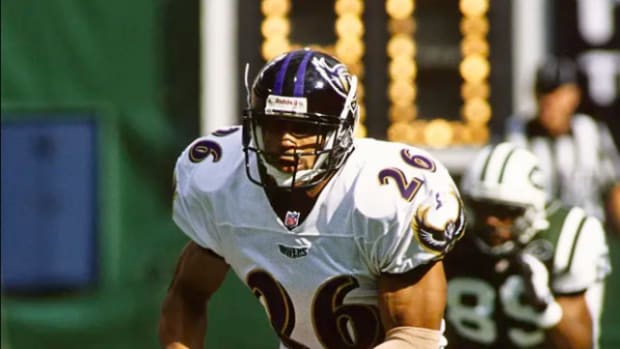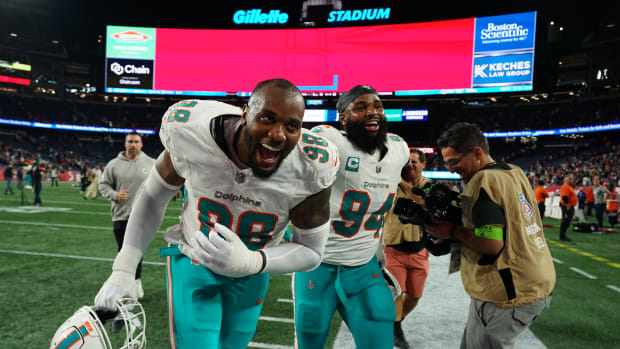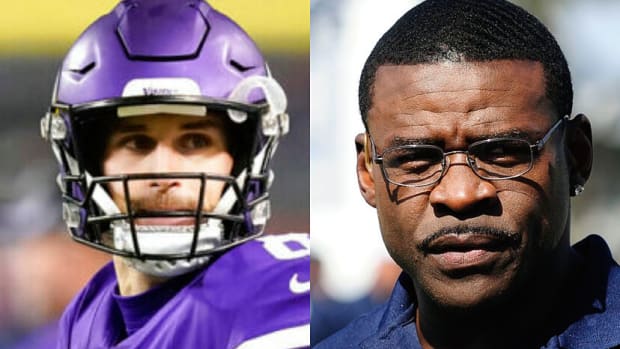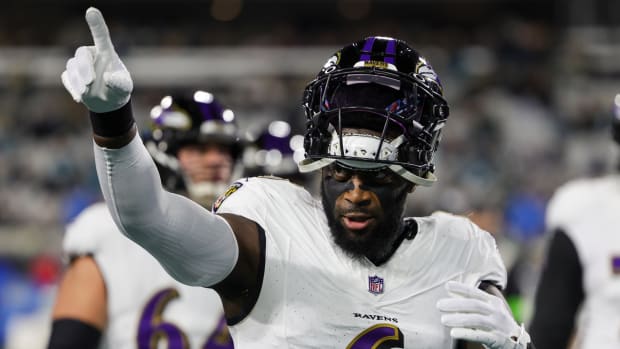The Jets’ GM Interviews Are Off and Running | The MMQB NFL Podcast
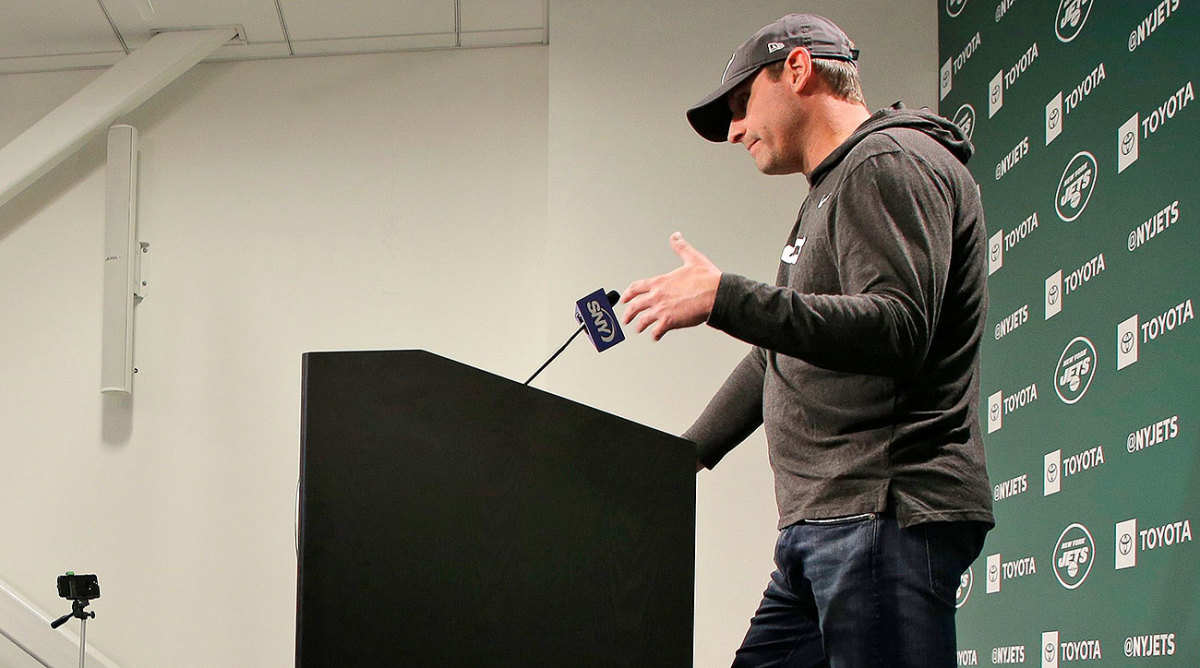
We’re exactly two weeks removed from when the Jets fired Mike Maccagnan as GM, and discussion about who the franchise will hire to replace him has dominated the news since. On this week's episode of The MMQB NFL Podcast, Albert Breer, Jenny Vrentas and Conor Orr talk about why it seems like the Jets are trying to skirt the Rooney Rule here—and that the NFL should remember why the rule was instituted in the first place.
(Listen to the latest The MMQB NFL Podcast here. The following transcript has been edited and condensed for clarity.)
Breer: This is what everybody's been talking about for the last two weeks. The Jets' interviews are off and running, the team faces an uphill challenge as they attempt to—I'm going to mention here that Conor wrote these, and I haven't read them yet, so if I start laughing or anything like that, that's why—the team faces an uphill challenge as they attempt to creatively subvert the Rooney Rule while also convincing someone friendly with Adam Gase to take the job. Will this end up succeeding or will the Jets just wish they had held on to old wishy-washy Maccagnan for another year?
Look I think that one way out of this is to hire the guy that everybody has connected to them the whole time. And that's Joe Douglas, who has a pre-existing relationship with Adam Gase, who's really well respected, who can build a good scouting staff. The Rooney Rule thing here is tricky... because his name was out there so early, like well before the firing happened. The firing had been shot down, the idea that he was going to be fired or been shot down several times his name was out there before that. So that's where this one really, really gets interesting.
Orr: Yeah, I agree with our colleague Jonathan Jones, who wrote a great piece kind of encouraging people to be aware of that if you're interviewing for the job. I mean if something like that happens, don't interview. I mean, don't set yourself up to be bulldozed, much like the Raiders did when they hired Jon Gruden. There were legitimate sham interviews that were constructed.
Breer: Here's the question though: If you know who you're going to hire ... A lot of organizations which just have lists, and it would be like here's our first guy like how do you force someone to have an open process when there's someone they were targeting all along? That's the question I have. That's what makes it hard. I think hiring Jon Gruden is different than say hiring Zac Taylor. You know what I mean? I think hiring like this just it's ... There are certain guys that are out there where it's like, the guy isn't winning the job, the team's recruiting the guy. I think those are the ones where it gets a little tricky now. This is like a little bit of a gray area because Joe Douglas is really well respected, but he's not like on the level of a Super Bowl-winning coach. But that's where sort of there could be moving parts with the Rooney Rule that makes it a little bit more difficult. The Rooney Rule was put in place to make sure that there's a quality in searches like the Bengals search for Zac Taylor. I think the ones where it's more difficult is where like the Raiders have been trying to get Jon Gruden to take that job for five years. So it's like how does that not become a—you know what I'm saying? That's a little bit more difficult. And I wonder if there's like there's a way to fix that because I just I don't know what the answer is there.
Vrentas: The Rooney Rule is not perfect, and I think we have seen with coaching searches that there are minority coaches who will refuse to take an interview at a place unless another minority has been interviewed before them so that they know that it's not a Rooney Rule interview. But that's also something that you can do perhaps your second or third year in the process when you feel like you have a little bit more sway and you've interviewed before it's not the first time you've interviewed. So it's sort of it's a difficult question to answer, right? Because if you've never interviewed for a general manager job before, and you go into this knowing that it's a sham interview. I think everyone would have a different answer to that question right. There's going to be some people that are going to say it's a chance for me to get in front of an owner to practice interviewing, to make connections, it's my name getting in the cycle because there are definitely cases where ... And the Jets case is not one of them because there's not a consultant involved and I think these consultants involved is generally a bad idea. But a lot of times if you interview with the team and there is a consultant involved there's a good chance the consultant might be involved with another team and then they say hey when we had this opening I remember this guy and he was really good and maybe you would you know really be a front runner for another job as a result of that.
Breer: I think Brian Flores is a good example of this. I'd say 18 months ago, no one was thinking of him as like a head coaching candidate. He interviewed in Arizona, Steve Wilks wound up getting the job. Now that's different obviously—Brian Flores wasn't a sham interview, but like he was just in the process. And it turns out, he was No. 2 For that job. And then word got around about how well he interviewed there. And so by doing that interview, word just kind of got out there that he interviewed really well, this is an impressive guy. And now all of a sudden, I mean, he interviewed at, what, four different places and got a job the next year. And so that's the other piece of it too. I think that that's sort of the intention of it too—to get guys opportunities earlier. So you know like their name gets into the mix and all of that, and I don't think it's a ... I don't know, that part of it is just like for for someone like Chip Kelly who hasn't had his name connected the GM openings yet, like it can be a positive exercise to go through that.
Orr: I think the rule—we just need to rethink why they instilled it in the first place. It's not a speed bump. It's like it's exactly why—like if you're the Jets right now you're already three quarters of the way down the road with somebody in the Rooney rules designed for you to stop and say 'Huh why am I here with this guy right now?' You know what I mean? Why don't we take a step back. Why don't I, you know, extend the process and just think about things for a second. I think that the rule was designed to sort of to just at least widen people's ideas and people's thoughts widen people's perspectives. But I mean the fact that Joe Douglas's name was out there before Maccagnan is even fired kind of makes it seem like the Jets are three-quarters of the way down the road with this guy. They're going to try to grab him.
Breer: I'm just sort of thinking out loud here. I'm wondering if there's a way, if you really are against guys going in when the job is someone else's already. ... Who was it that interviewed for the Raider job?
Orr: Tee Martin.
Breer: So if you're really against a guy going in an interview like like that sort of thing happening, I wonder if there's a way to like have a team designate a target. You know what I mean, and say, look if you really want to end this, like if you really want to make this legitimate and separate one set one thing from another right then I wonder if there's a way where you say, a team can say we're targeting this guy. And then it becomes like an exclusive negotiating thing. Like where not only that that coach is talking to a team, that team can't talk to anybody else. You know what I mean? And then that then one way or another either gets done or it doesn't happen like it gets done or doesn't happen. And then either they have their coach, or they move on and then they're subject to the rule. Does that make sense?
Vrentas: Conor, your point was a good one. We should get back to what the rule was designed for. I think a lot of times what it's become now is just this formality that you have to check. And I think you know that's why we're we're getting worse, I think, in terms of positions of leadership and a lack of minority voices in those roles. I think anytime you have a disparity in who's getting certain jobs, there's always this catch up period. You know you see this with female coaches and trying to grow more of a pipeline for female coaches, and they're creating deliberate opportunities for women to get jobs and no one likes to be in that position. No one wants to feel like you're getting a job because of some identifying feature about you. But that sort of sometimes what you have to do to catch up the pipeline. It's very different for minorities because there are already people in leadership roles that would be great for the top positions that aren't being considered for them. In a lot of ways you know it's like a willful ignorance I think. So I think just reminding what the rules is for and keeping that in mind early on when you're when you're thinking about candidates. But the problem is when the target's out there,then it does become a sense of just checking a box and this catch-up.
Breer: I just don't think, like, they're not all the same. Mike Shanahan, when he was out there in 2010, the Redskins were clearly going there. There are those, which is almost like an active recruitment of a coach. Like the Eagles going after Chip Kelly, that's different. Like 10 guys are going to come in an interview, and we're going to pick one.
Orr: Maybe if the Eagles had spent more time saying 'Why are we three-quarters of the way down the road with Chip Kelly.' ... To tie this in full circle, it would be as if Jenny as a young person in State College went into the Wendy's SuperBar for the first time and said 'I'm only getting pasta,' and then just walked past the entire rest of the super food bar, and then we might have never had this conversation. She kept an open mind. She started mixing ground beef and sour cream and chocolate-vanilla pudding, and came up with this cornucopia of excellent food.
Vrentas: You know, it's a really important memory in my childhood having all of those options eat from off of my plates.
Orr: I think we just solved it. We just solved the world's problems.
Vrentas: Stop at the Mexican fiesta, not just the pasta bar!
Question or comment? Email us at talkback@themmqb.com.

































